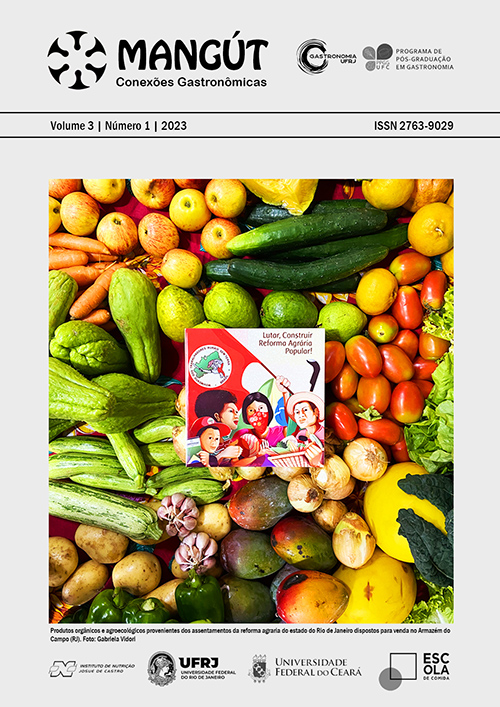Recognition and characterization of consumption and food uses of the mollusc “sarnambi” – Anomalocardia brasiliana (Gmelin, 1791) – by the population of the Greater São Luís Metropolitan Region (MA)
DOI:
https://doi.org/10.70051/mangt.v3i1.54191Keywords:
Gastronomy, Biodiversity, Sarnambi, Anomalocardia brasiliana, Mollusk.Abstract
Brazil is one of the countries with the greatest biological diversity in the world, which is still undervalued as a food resource, generating problems of food sovereignty and security. Among the native mollusc species of the Metropolitan Region of Greater São Luís (MA), is the sarnambi (A. brasiliana). In this context, the study aimed to analyse the popular knowledge and consumption of the species in the region, generating information for its valorisation as a food resource. For this characterisation, a virtual questionnaire was applied in a sample form to 430 people (Sample error = 4.8%, p<0.05). Most of the interviewees (72%) know the mollusc and consume it (62%), while the term "sarnambi" is the most used as a popular denomination (78%). The frequency of consumption is low (4.6% weekly; 43% once or a few times in a lifetime), affected by the lack of knowledge of how to prepare it and the difficulty of finding the shellfish in the local market. The acquisition of the resource occurs primarily in street fairs, markets and fishmongers, with home preparation. Among the gastronomic preparations indicated in the study, the following stand out: salty pie, stews, risottos, broths, soups and omelets.
Downloads
Published
Issue
Section
License
Copyright (c) 2023 Fernanda Avelino Ferraz, Liz Cristina Camargo Ribas, Léo Serpa

This work is licensed under a Creative Commons Attribution 4.0 International License.
Autores que publicam nesta revista concordam com os seguintes termos:
- Autores mantém os direitos autorais e concedem à revista o direito de primeira publicação, com o trabalho simultaneamente licenciado sob a Licença Creative Commons Attribution que permite o compartilhamento do trabalho com reconhecimento da autoria e publicação inicial nesta revista.
- Autores têm autorização para assumir contratos adicionais separadamente, para distribuição não-exclusiva da versão do trabalho publicada nesta revista (ex.: publicar em repositório institucional ou como capítulo de livro), com reconhecimento de autoria e publicação inicial nesta revista.
- Autores têm permissão e são estimulados a publicar e distribuir seu trabalho online (ex.: em repositórios institucionais ou na sua página pessoal) a qualquer ponto antes ou durante o processo editorial, já que isso pode gerar alterações produtivas, bem como aumentar o impacto e a citação do trabalho publicado (Veja O Efeito do Acesso Livre).



